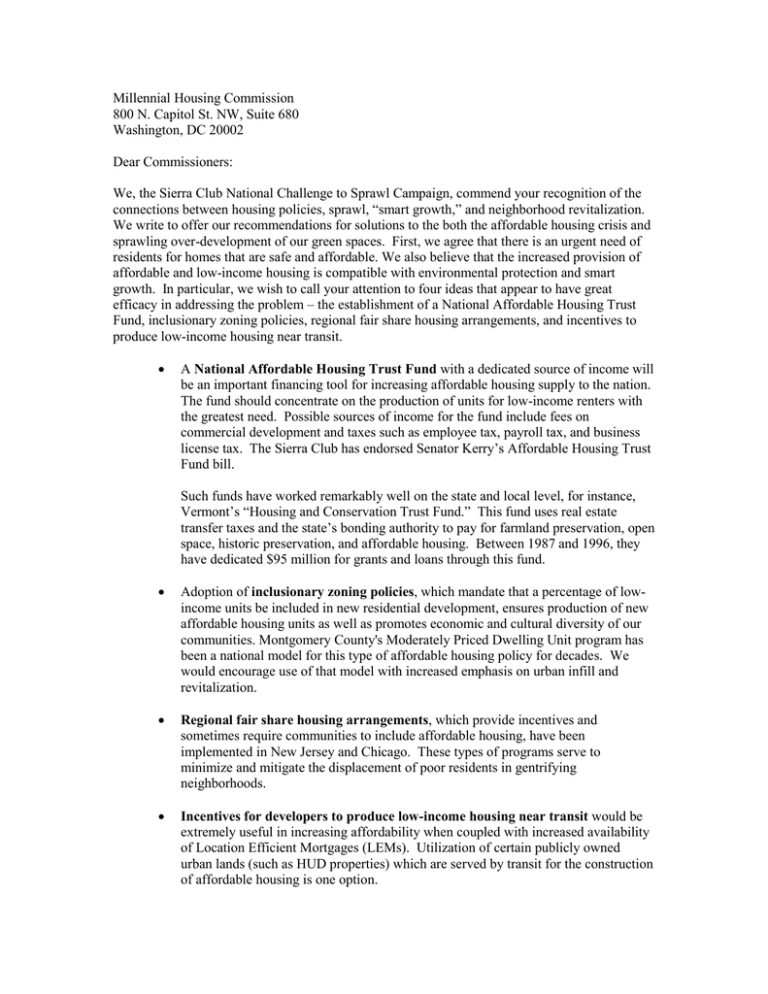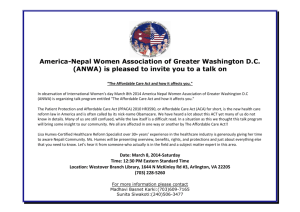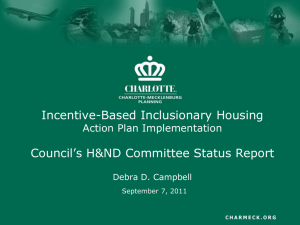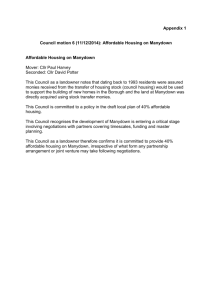Millennial Housing Commission 800 N. Capitol St. NW, Suite 680
advertisement

Millennial Housing Commission 800 N. Capitol St. NW, Suite 680 Washington, DC 20002 Dear Commissioners: We, the Sierra Club National Challenge to Sprawl Campaign, commend your recognition of the connections between housing policies, sprawl, “smart growth,” and neighborhood revitalization. We write to offer our recommendations for solutions to the both the affordable housing crisis and sprawling over-development of our green spaces. First, we agree that there is an urgent need of residents for homes that are safe and affordable. We also believe that the increased provision of affordable and low-income housing is compatible with environmental protection and smart growth. In particular, we wish to call your attention to four ideas that appear to have great efficacy in addressing the problem – the establishment of a National Affordable Housing Trust Fund, inclusionary zoning policies, regional fair share housing arrangements, and incentives to produce low-income housing near transit. A National Affordable Housing Trust Fund with a dedicated source of income will be an important financing tool for increasing affordable housing supply to the nation. The fund should concentrate on the production of units for low-income renters with the greatest need. Possible sources of income for the fund include fees on commercial development and taxes such as employee tax, payroll tax, and business license tax. The Sierra Club has endorsed Senator Kerry’s Affordable Housing Trust Fund bill. Such funds have worked remarkably well on the state and local level, for instance, Vermont’s “Housing and Conservation Trust Fund.” This fund uses real estate transfer taxes and the state’s bonding authority to pay for farmland preservation, open space, historic preservation, and affordable housing. Between 1987 and 1996, they have dedicated $95 million for grants and loans through this fund. Adoption of inclusionary zoning policies, which mandate that a percentage of lowincome units be included in new residential development, ensures production of new affordable housing units as well as promotes economic and cultural diversity of our communities. Montgomery County's Moderately Priced Dwelling Unit program has been a national model for this type of affordable housing policy for decades. We would encourage use of that model with increased emphasis on urban infill and revitalization. Regional fair share housing arrangements, which provide incentives and sometimes require communities to include affordable housing, have been implemented in New Jersey and Chicago. These types of programs serve to minimize and mitigate the displacement of poor residents in gentrifying neighborhoods. Incentives for developers to produce low-income housing near transit would be extremely useful in increasing affordability when coupled with increased availability of Location Efficient Mortgages (LEMs). Utilization of certain publicly owned urban lands (such as HUD properties) which are served by transit for the construction of affordable housing is one option. LEMs allow a mortgage lender to recognize the transportation-related cost savings of living in convenient, high-density communities with transit access by adding the savings onto the qualifying income of the consumer. As representatives of the Sierra Club, we do not pretend to be experts on the production of affordable housing. Nevertheless, we strongly believe that the production of affordable homes is an integral element in revitalizing our neighborhoods. We want to see cities that are livable for residents of all incomes. Just as biodiversity nourishes a healthy natural environment, culturally and economically diverse neighborhoods give life to a thriving city. If we can restore and improve the neighborhoods where we already live, we can spare our rapidly disappearing wilderness, parks, farms, and open space from becoming another suburb. Thank you for your time and consideration. Sincerely, Melody Flowers National Conservation Organizer Sierra Club Challenge to Sprawl Campaign


